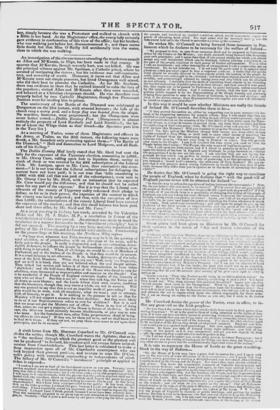An investigation of the circumstances attending the murderous assault en
Allen and M'Kenzie, in Sligo, has been made in that county. It appears that M'Kerzie, though severely hurt, was not killed. He was the principal witness against Mr. Spelman, a Catholic priest, whom he accused of instigating the rioters ; but his evidence was self-contradic- tory, and unworthy of credit. Moreover, it turns out that Allen and M'Kenzie were not simple peasants, but hired Orangemen well armed, who did their best to provoke the Catholics. As for Mr. Spelman, there was evidence to show that he excited himself to calm the fury of the populace ; visited Allen and M'Kenzie after they were wounded, and behaved as a Christian clergyman should. He was therefore very properly bailed by two Catholic Magistrates, though five Protestant Justices were for sending him to prison.
The anniversary of the Battle of the Diamond was celebrated at Dungannon on the 21st instant, with unusual honours ; the bells of the church rung a merry peal, and a large flag was hoisted from the steeple. No murders, however, were perpetrated ; but the Orangemen were never better armed.—Dublin Evening Post. [Dungannon is almost entirely the property of Lord Ranftirly and Lord Northland ; the lat- ter of whom the Whigs claim as their friend—the Spectator puts him in the Tory list.]
At a meeting of Tories, some of them Magistrates and officers in the Army, at Tralee, on the '20th instant, the following toasts were drunk, a Mr. Saunders only protesting against them—" The Battle of the Diamond," " Hell and damnation to Lord Mulgrave, and all Radi- cals of his feeling."
The Dublin Evening Mail lately stated that Mr. Shell had sent the bills for the expenses of the Tipperary election, amounting to 5,0001.,
to Mr. Otway Cave, calling upon him to liquidate them, saving so much of them as was covered by the 400/. subscription of the Liberal Club. Mr. Lanigan, agent to Mr. Cave, thus contradicts this state- ment—" It is not true that the Liberal subscriptions for defraying the contest have not been paid; it is not true that 'bills amounting to 5,000/. with 4001. (all that was paid of the subscription), were sent to Mr. Otway Cave by Mr. Sheil, with an intimation that be expected
Mr. Cave would pay the difference, and that he should not be called upon for any part of the expense.' But it is true that the Liberal con-
stituents of the county of Tipperary nobly redeemed their pledge to defray, as far as in their power, the expenses of the contest to which the county was lately subjected ; and that, with the exception of less
than 1,0001., the subscriptions of the county Liberal fund have covered the expenses of the contest ; and that this small balance has been paid, share and share alike, by Mr. Shell and Mr. Cave."
At a great meeting in Galway last week, attended by Sir Valentine Blake and Mr. M. J. 131ali e, M. P., a resolution in favour of the tofu/abolition of tithes was passed. An attempt was made to word the resolution in a manner favourable to the "instalment principle ;" but it did not succeed. The meeting by a very large majority repudiated the policy of Mr. O'Connell, and declared for total abolition. Commenting on the proceedings at this meeting, the cabers says-
" We hope that, wherever Anti Tithe meeticgs may be held, the question of total abolition, or of perpetuation with an alteration of lie name, will be fairly put to the people. It really is disgraceful, and, in our estimation, down- rightly dishonest, to inflame the people by declamations about abolition, if no such thing is intended. What, of all things, we would be-(e.di of Members of
Parliament and of the leaders of the People, is that they would be in earnest.
It is a cruel delusion to act otherwise. It is, besides, destructive of the influ- ence of the Irish .Members. When they cry out • Wolf, yid,' too frequently, and no wolf is it hand, they are not believed when the real danger arrives. They talked last session and before it of their determination to have tithes
• abolished ;' and the half-dozen Members of the House who dared to vote for
abolition, were denounced as impracticables and enemies to the People! Can it be wonderful if the People of England entertain doubts of the sincerity of men who act thus ? But this is not all : when they talk big, the Tories set it
all down as mere bluster ; and the Lords follow their own course, confident
that the blusterers, though they may storm a while, are not in earnest. Will
any one pretend to say that this is not an impolitic mode of proceeding? Our
Om would be, to state, with all simplicity, what we want ; and to attempt, with all honesty, to get it. It is nothing to the purpose to tell us that the
Ministry will not support a measure for total abolition. Are they more likely to do so if our Representatives refuse to vote for abolition? But it is said
that we must not put the Ministry out of office. There is no fear of doing that, unless we can get a majority of the House in favour of abolition. In that
case, the Alinistry would certainly become Abolitionists, or giie way to men who were. Are the Instalment men, alias Tithe •perpetuators, afraid of bring- ing affairs to this state? If they are, let them tell us so, and we shall know how to deal with them. If they are not, we pray them once more to act upon their principles, and be in earnest."


























 Previous page
Previous page